
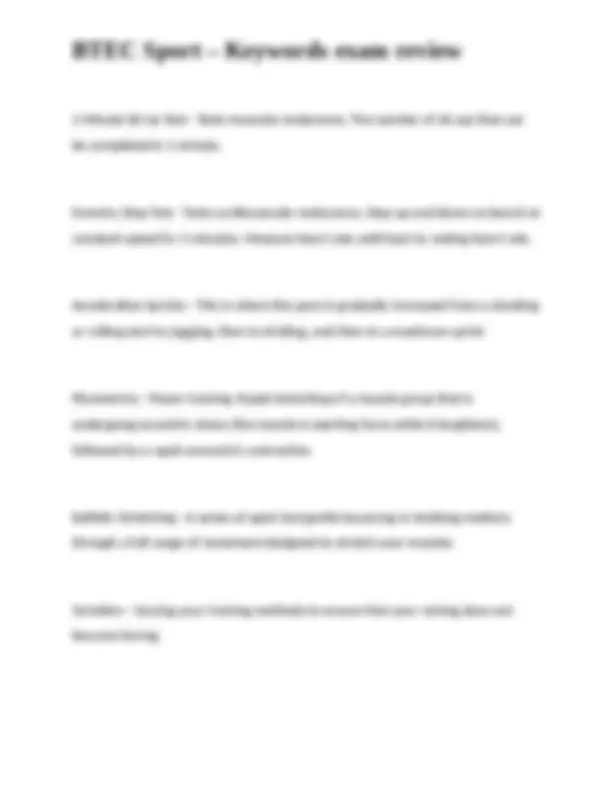
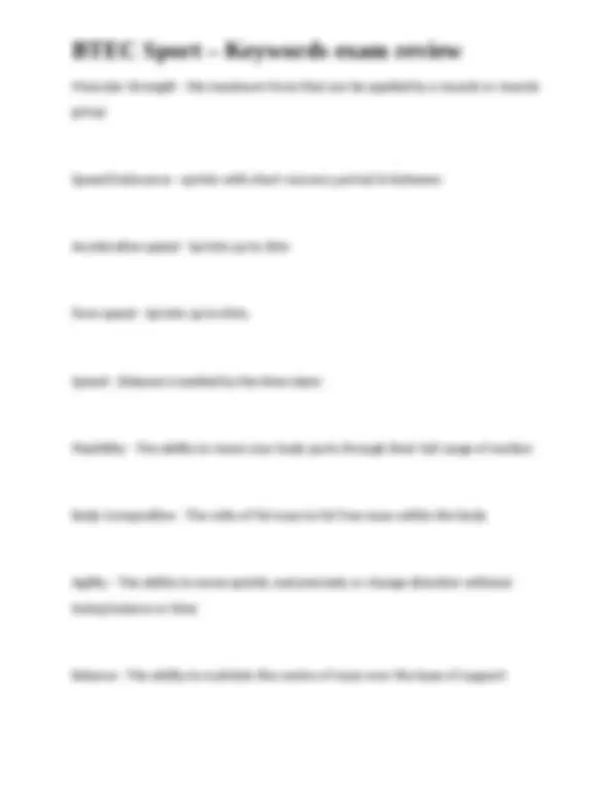
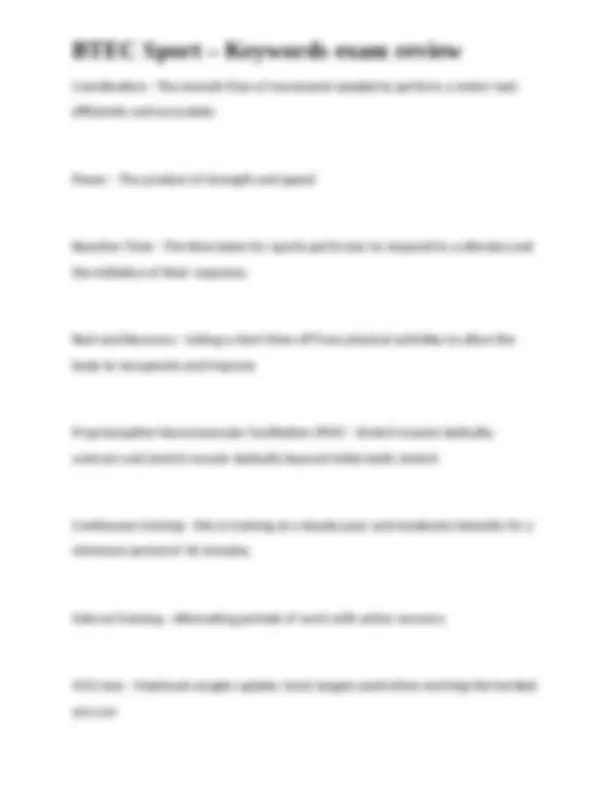
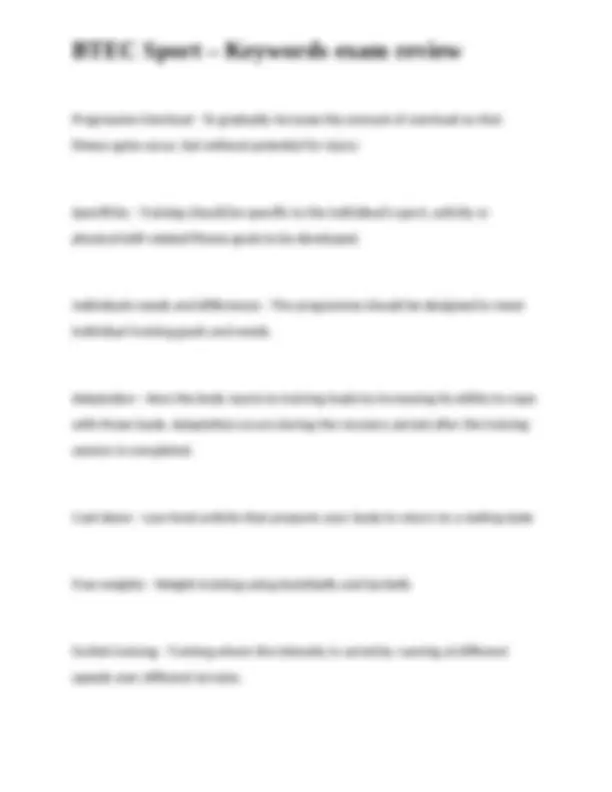
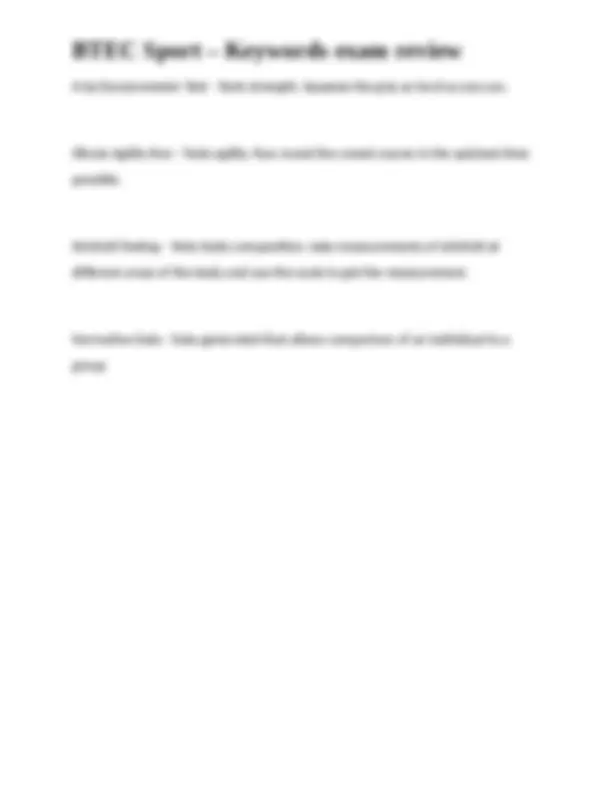


Study with the several resources on Docsity

Earn points by helping other students or get them with a premium plan


Prepare for your exams
Study with the several resources on Docsity

Earn points to download
Earn points by helping other students or get them with a premium plan
Community
Ask the community for help and clear up your study doubts
Discover the best universities in your country according to Docsity users
Free resources
Download our free guides on studying techniques, anxiety management strategies, and thesis advice from Docsity tutors
A comprehensive review of key terms and concepts related to sports and fitness testing for the btec sport program. It covers a wide range of topics, including aerobic endurance, the cardiorespiratory system, muscular endurance, flexibility, speed, power, agility, and body composition. The document also discusses various fitness tests and training principles, such as the multistage fitness test, vertical jump test, 1 minute press up test, forestry step test, plyometrics, interval training, and the borg rpe scale. By studying this document, students can gain a deeper understanding of the fundamental aspects of sports and fitness, which are essential for success in the btec sport program. The detailed explanations and definitions of key terms make this document a valuable resource for both students and educators in the field of sports and exercise science.
Typology: Exams
1 / 9

This page cannot be seen from the preview
Don't miss anything!






Aerobic Endurance - The ability of the cardiorespiratory system to work efficiently, supplying nutrients and oxygen to working muscles during sustained physical activity. Cardiorespiratory System - Consists of the cardiovascular system (heart, blood and blood vessels) and the respiratory system (lungs and airways). Cardiovascular System - The heart, blood and blood vessels Respiratory System - Lungs and airways Waste Products - Products that form in the body as a result of exercise that are not needed. Muscular Endurance - The ability of the muscular system to work efficiently, where a muscle can continue contracting over a period of time against a light to moderate fixed resistance load. Reversibility - the training principle that fitness improvements are lost when training is lowered or stops
Static Stretching - a technique in which a muscle is slowly and gently stretched and then held in the stretched position 1 Rep Max (1RM) - The maximum amount a performer can lift in one repetition Hollow Sprints - A method of training used to increase speed. Athlete will sprint for a set distance, slow down and then sprint again. Multistage Fitness Test - Tests cardiovascular endurance. Jogging between 2 lines, 20m apart, ensuring that you get to the line before the beep. Vertical Jump Test - Tests power. Jump as high as you can, measurement between standing height and jumping height taken. Reliability - Consistency of measurement. If you completed the test again, would you get the same results. Validity - The ability of a test to measure what it is intended to measure 1 Minute Press Up Test - Tests muscular endurance. The number of press ups that can be completed in 1 minute.
Muscular Strength - the maximum force that can be applied by a muscle or muscle group Speed Endurance - sprints with short recovery period in-between Accelerative speed - Sprints up to 30m Pure speed - Sprints up to 60m. Speed - Distance travelled by the time taken Flexibility - The ability to move your body parts through their full range of motion Body Composition - The ratio of fat mass to fat free mass within the body Agility - The ability to move quickly and precisely or change direction withoiut losing balance or time Balance - The ability to maintain the centre of mass over the base of support
Coordination - The smooth flow of movement needed to perform a motor task efficiently and accurately. Power - The product of strength and speed Reaction Time - The time taken for sports performer to respond to a stimulus and the initiation of their response. Rest and Recovery - taking a short time off from physical activities to allow the body to recuperate and improve Proprioceptive Neuromuscular Facilitation (PNF) - Stretch muscle statically, contract and stretch muscle statically beyond initial static stretch Continuous training - this is training at a steady pace and moderate intensity for a minimum period of 30 minutes. Interval training - Alternating periods of work with active recovery VO2 max - Maximum oxygen uptake; most oxygen used when working the hardest you can
Time - How long an individual will train for Type - The selected training method that an individual would use. Warm up - an activity that prepares the muscles and the rest of the body for exercise Circuit training - Performing a series of exercises, one after the other. The stations can be targeted on the component of fitness that needs to be Sit and reach test - Tests flexibility. Reach as far forward as you can with your feet flat to the box. 35 Metre Sprint Test - Tests speed. Sprint 35m as quickly as you can. Bioelectrical Impedance Analysis (BIA) - Tests body composition. Running a low- level electrical current through the body. Pretest procedures - Various procedures that take place before testing. Gaining consent, checking equipment.
Progressive Overload - To gradually increase the amount of overload so that fitness gains occur, but without potential for injury Specificity - Training should be specific to the individual's sport, activity or physical/skill-related fitness goals to be developed. Individuals needs and differences - The programme should be designed to meet individual training goals and needs. Adaptation - How the body reacts to training loads by increasing its ability to cope with those loads. Adaptation occurs during the recovery period after the training session is completed. Cool down - Low-level activity that prepares your body to return to a resting state Free weights - Weight training using dumbbells and barbells Fartlek training - Training where the intensity is varied by running at different speeds over different terrains.